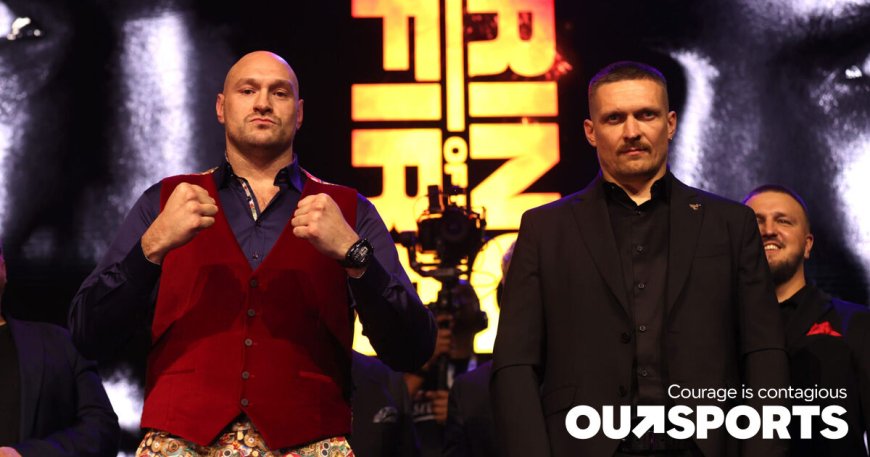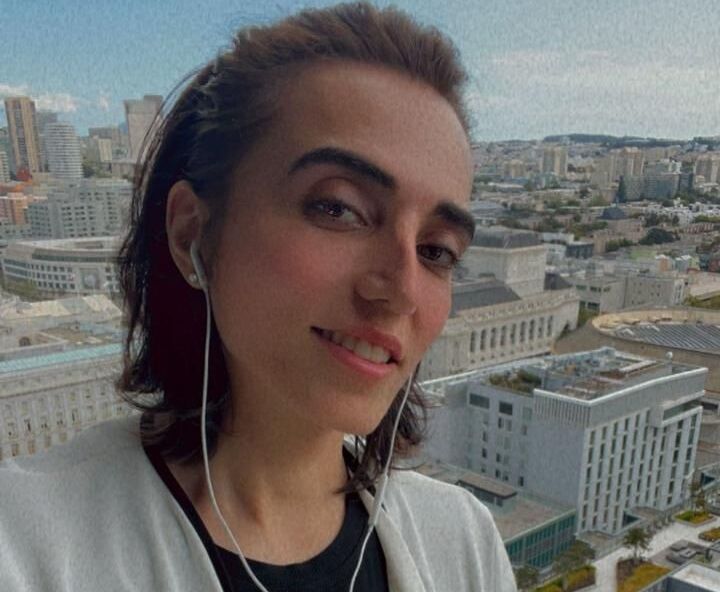Tyson Fury and Oleksandr Usyk fight in Saudi Arabia, while LGBTQ people fight for their lives
The purse for “Ring of Fire” between Tyson Fury and Oleksandr Usyk in Riyadh is reportedly $150 million. Is it covering up LGBTQ abuses? The post Tyson Fury and Oleksandr Usyk fight in Saudi Arabia, while LGBTQ people fight for their lives appeared first on Outsports.

The first fight this century to decide who is the undisputed heavyweight champion of the world will be held Saturday in Saudi Arabia.
Around 25,000 fans are expected at Riyadh’s Kingdom Arena and millions more will pay to watch as Tyson Fury and Oleksandr Usyk slug it out for a purse worth a reported $150 million.
Blood was spilled early on in fight week when Fury’s father was left with a gash on his forehead in the lobby of the Hilton Hotel after headbutting a member of Usyk’s entourage for being “very disrespectful.”
It’s rare to see such aggression outside the boxing ring in strictly conservative Saudi Arabia. But John Fury’s injury was a mere scratch compared to what the state inflicts on its most dissenting citizens.
From January to April, 55 people were executed in the Gulf state, according to Ministry of Interior figures. The European Saudi Organization for Human Rights (ESOHR) reports that two of those put to death were women. More than a third of those killed had no sentence recorded.
Mohammad bin Nasser al-Ghamdi, a retired schoolteacher, is among those on death row. His “crime” was posting his opinions on social media.
Manahel al-Otaibi has been sentenced to 11 years in jail for “her choice of clothing and support for women’s rights.” Many more are incarcerated.
Amid all these human rights abuses, relatively little is said about the plight of LGBTQ people in Saudi Arabia, where homosexuality is criminalized and online activity closely monitored.
One of the few advocates for this community is Tariq Aziz.
He is originally from Dammam and was imprisoned in May 2021 for 12 months after being told his tweets violated Sharia law, having previously been harassed by police for being effeminate. Aziz is gay and identifies as nonbinary.
He fled Saudi Arabia last year and now lives in San Francisco, where he is studying human rights and working with the Alwan Foundation, the nonprofit organization set up by Qatari activist Dr. Nas Mohamed.

Aziz keeps track of Saudi leader Mohammed bin Salman’s sportswashing and asks that fans watching the fight pause to think about those who are “hidden” from view.
“I know a lot of people don’t care as much about human rights — they just want fun, a good show, good sport,” Aziz tells Outsports.
“But it’s a fake picture.”
Amnesty International UK director Peter Frankental agrees, telling BBC Sport that the big fight is a big cover-up.
“Glitzy events like Fury vs. Usyk are designed to rebrand Saudi Arabia as a ‘sporting hub’ while deflecting attention from the country’s jailing of women’s rights activists, suppression of free speech and rampant use of the death penalty,” he said.
For Aziz, this doesn’t go far enough. His frustration stems from the continued erasure of his community, including by his fellow activists.
“The people who talk about human rights in Saudi Arabia, it’s like they’re ashamed to mention LGBTQ rights,” he says.
“It’s just focused on women’s rights and the freedom of speech — and that is very important.
“But LGBTQ is also important and nobody speaks about them. I don’t know why there is always this shame. It’s like they are nothing.”
Aziz still loves Saudi Arabia — “it’s my home, my country” — but he felt he had no option but to seek asylum abroad, and not just because of his activism.
“My papers are male, but I’m nonbinary and more feminine. That is very much a problem in Saudi Arabia,” he explains.
“If you’re gay but masculine, maybe you can hide yourself. But even if I’m just walking in the street, or I’m in the mall or a cafe, I’m asked, “why you are like a girl? Why do you have long hair and no moustache? Why is there nothing that makes us feel you are a man?”
The two faces of Saudi Arabia
With the world watching this week, Saudi Arabia is putting on a show, stage managed by its entertainment and sports chief, Turki Alalshikh. This is the version of itself that it wants the West to see, driving tourism and investment.
Fury told The Telegraph this week that “Saudi is amazing, very welcoming… it’s the opposite out here to what I had heard.” Not that a sportsman with a well-documented history of homophobia would take much interest in LGBTQ rights.
Aziz calls out the hypocrisy, such as how Cristiano Ronaldo’s girlfriend Georgina Rodriguez is allowed to post pictures of herself in a bikini on social media from within the country. “The government has two faces. One face deals with the foreign tourist, and the other face — the ugly one — deals with things like the Saudi LGBTQ.”
He mentions the recent pledge given to female tennis players who have girlfriends and who might qualify for the WTA Finals in Riyadh in November, that they can share a hotel room. “It’s actually funny that they said we are accepting lesbian players now.”
Since last year, the Visit Saudi website has included the question “Are LGBT visitors welcome to visit Saudi?” among its FAQs. “Everyone is welcome,” reads the guidance. “We will strongly respect your right to privacy.”

Despite this, FC Barcelona felt it necessary to issue a warning to any LGBTQ fans who might have traveled there for the Supercopa match in January.
Meanwhile, influential figures within Saudi Arabia are dishing out advice to the country’s 37 million citizens on how to treat LGBTQ people. Aziz recalls a widely reported sermon given last year by the imam of Mecca’s Grand Mosque.
“He spoke publicly about how we should as Muslims hate LGBTQ. And how we didn’t accept that in our society.
“Families don’t accept LGBTQ people because the problem is not only with the government, it’s with the society. But it’s the government that feeds hate.”
Most members of Aziz’s own family have cut him off. He is grateful to Dr. Nas and the friends he has made through the Alwan Foundation.
They are currently assisting a gay Palestinian who was living in Qatar where they were at risk. The organization is looking to raise funds to help more refugees in similar situations who are facing persecution.
It’s an understatement to say LGBTQ people living in Saudi are an afterthought this week, amid all the Fury-Usyk hoopla.
But Aziz says some would have liked to watch the WTA Finals or other events in the kingdom.
“Many of them like sport, they’d like to attend these events and just be who they want to be, wear what they want to wear — but they cannot. They have to be hidden.”
The post Tyson Fury and Oleksandr Usyk fight in Saudi Arabia, while LGBTQ people fight for their lives appeared first on Outsports.

 Mark
Mark  At least 71 threatened with execution are in danger, including 9 minors. We believe the number is higher.
At least 71 threatened with execution are in danger, including 9 minors. We believe the number is higher.





